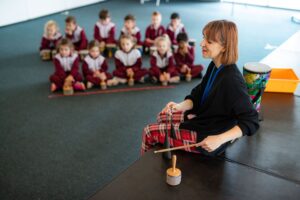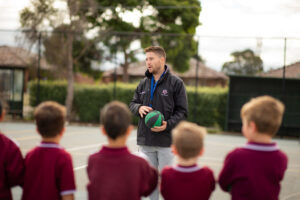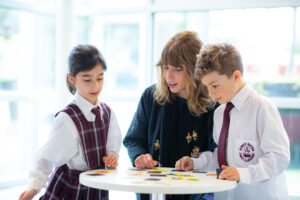The specialist classes at St Peter’s School are Performing and Visual Arts, Physical Education, STEM and Japanese.
Performing Arts

The Performing Arts specialist program encompasses Music, Drama, Dance and Media Arts. As part of our weekly lessons, students explore and discover these avenues of creative expression through student-led curriculum based learning.
Alongside this is our Glee lunch club, where students can join in singing and dancing as well as individual share-time. Students also look forward to their senior year at St Peters’ for the privilege to have jam sessions with fellow classmates using various instruments. St Peter’s showcases the talents and creativity of their students in a bi-annual stage production.
Physical Education

At St Peters students will have the opportunity to engage in weekly timetabled physical education classes. These classes allow students to develop fundamental motor skills, fitness and game sense.
Amongst our weekly lessons, students have the opportunity to participate in major carnivals such as district, divisional and state competitions. All year 3-6 students are encouraged to be involved in the athletics, cross-country and swimming carnivals offered throughout the year.
All year 6 students compete in the School Sport Victoria (SSV) District Interschool Winter and Summer Sports. This gives students the opportunity to demonstrate teamwork and ‘sportspersonship’ traits on a weekly basis. There are also a number of gala days provided for year 6 students to demonstrate their skills in a variety of sports such as soccer and AFL.
Students across all year levels are also able to participate in the intensive swimming program. This program is run by swimming instructors and emphasises the importance of safety around water and provides basic skills within the water environment.
STEM
Through our ‘STEM for Sustainability’ program, we take a developmental approach to learning, carefully scaffolding experiences that help students build essential skills in problem-solving, design, critical thinking, risk-taking, perseverance, and curiosity. Through hands-on activities, students are not only exposed to technical knowledge, but also develop key dispositions such as collaboration, teamwork, and self-management. These experiences, rooted in project-based learning, encourage students to explore and address real-world problems in the context of sustainability and environmental challenges. By working together, they apply their critical thinking and communication skills to find practical solutions, all while cultivating their ability to research, manage their own learning, and engage in meaningful collaboration.
At Saint Peter’s Primary, we embrace the responsibility of environmental sustainability by promoting the conservation of natural resources and the protection of ecosystems to support the wellbeing of our community now and for years to come. In our ‘STEM for Sustainability specialist program, we explore Science, Technology, Engineering, and Mathematics within the context of biodiversity, energy and water conservation, and waste management.
At Saint Peter’s Primary, our sustainability vision is for our students and school community to adopt lifelong sustainable practices. Our aim is to:
- Reduce our school’s ecological footprint to encourage biodiversity, minimise waste and reduce energy and water consumption
- Cultivate a sense of stewardship for the earth
- Foster a spiritual connection to the world, recognising it as a creation of God
- Encourage students to deepen their knowledge of the natural world
- Help students understand how their actions impact the environment and how they can contribute to positive change for a sustainable future
- Integrate sustainability into every aspect of school life
- Engage staff, students, families, and the parish in developing a deeper understanding of the importance of caring for our world
Language & Cultures: Japanese

Youkoso!
At St. Peter’s Primary School students study Japanese as a language other than English (LOTE) with a specialist teacher. The Japanese program is designed to help students learn through the development of their communication skills and the expansion of their intercultural awareness, appreciation and understanding.
The Victorian Curriculum acts as a guide for all lessons planned within the Japanese program. The junior curriculum focuses on teaching Japanese language through oral learning skills, this can be achieved through a wide range of activities such as songs, cultural demonstration, listening games and stories, speaking sessions and communication activities. The senior curriculum approach to teaching is based on student participation through structured routines and rich language activities as they start to learn more complex interactions and grammatical structures of the Japanese language. Through their learned language skills, students will demonstrate their understanding of Japanese through both oral and written forms.

